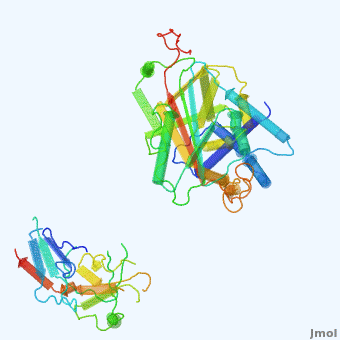We apologize for Proteopedia being slow to respond. For the past two years, a new implementation of Proteopedia has been being built. Soon, it will replace this 18-year old system. All existing content will be moved to the new system at a date that will be announced here.
Alpha-1-antitrypsin
From Proteopedia
(Difference between revisions)
| Line 1: | Line 1: | ||
| - | <StructureSection load='' size='350' side='right' scene='User:Daniel_Seeman/Alpha-1-antitrypsin/437437437437/1' caption=''> | + | <StructureSection load='' size='350' side='right' scene='User:Daniel_Seeman/Alpha-1-antitrypsin/437437437437/1' caption='Transition of α1-antitrypsin between active and inactive conformations '> |
__TOC__ | __TOC__ | ||
=== Function === | === Function === | ||
| - | + | ||
'''Alpha-1-antitrypsin''' (also known as α1-antitrypsin or A1AT) is an inhibitor of [[Elastase]] and [[Trypsin]]. It is a member of the '''Ser'''ine '''P'''rotease '''I'''nhibitor ([[:Category:Serpin|Serpin]]) family, and as such undergoes a conformational change where the substrate protein associates with a loop region on A1AT causing that loop to become ordered as a Beta Strand<ref name="nature_paper">''Nature'' '''455''', 1189-1190 (30 October 2008)</ref>. In this case Trypsin (the substrate) is inhibited when a covalent bond is formed to A1AT through the newly formed Beta region<ref name="nature_paper" />. Once bound covalently to its substrate the stability of the A1AT complex goes up drastically, making it an effective "molecular mousetrap"<ref name="nature_paper" />. With A1AT, as with most members of the Serpin family, the transition from inactive precursor protein to active complex comes after a cleavage event<ref name="nature_paper" />. | '''Alpha-1-antitrypsin''' (also known as α1-antitrypsin or A1AT) is an inhibitor of [[Elastase]] and [[Trypsin]]. It is a member of the '''Ser'''ine '''P'''rotease '''I'''nhibitor ([[:Category:Serpin|Serpin]]) family, and as such undergoes a conformational change where the substrate protein associates with a loop region on A1AT causing that loop to become ordered as a Beta Strand<ref name="nature_paper">''Nature'' '''455''', 1189-1190 (30 October 2008)</ref>. In this case Trypsin (the substrate) is inhibited when a covalent bond is formed to A1AT through the newly formed Beta region<ref name="nature_paper" />. Once bound covalently to its substrate the stability of the A1AT complex goes up drastically, making it an effective "molecular mousetrap"<ref name="nature_paper" />. With A1AT, as with most members of the Serpin family, the transition from inactive precursor protein to active complex comes after a cleavage event<ref name="nature_paper" />. | ||
Shown <scene name='User:Daniel_Seeman/Alpha-1-antitrypsin/437437437437/1'>on the right</scene> is a morph, generated by the <span class="plainlinks">[http://molmovdb.mbb.yale.edu/molmovdb/morph/ Yale Morph Server]</span> that shows A1AT going from its inactive form, to the conformation in which it is bound to Trypsin (also shown in the same animation)<ref>The <span class="plainlinks">[http://molmovdb.mbb.yale.edu/molmovdb/morph/ Yale Morph Server]</span></ref>. | Shown <scene name='User:Daniel_Seeman/Alpha-1-antitrypsin/437437437437/1'>on the right</scene> is a morph, generated by the <span class="plainlinks">[http://molmovdb.mbb.yale.edu/molmovdb/morph/ Yale Morph Server]</span> that shows A1AT going from its inactive form, to the conformation in which it is bound to Trypsin (also shown in the same animation)<ref>The <span class="plainlinks">[http://molmovdb.mbb.yale.edu/molmovdb/morph/ Yale Morph Server]</span></ref>. | ||
Revision as of 18:27, 18 October 2017
| |||||||||||
3D structures of Alpha-1-antitrypsin
Updated on 18-October-2017
References
- ↑ 1.0 1.1 1.2 1.3 1.4 Nature 455, 1189-1190 (30 October 2008)
- ↑ The Yale Morph Server
- ↑ Biochemistry, Fifth Edition, p.289.
Proteopedia Page Contributors and Editors (what is this?)
Michal Harel, Daniel Seeman, Alexander Berchansky, Joel L. Sussman

